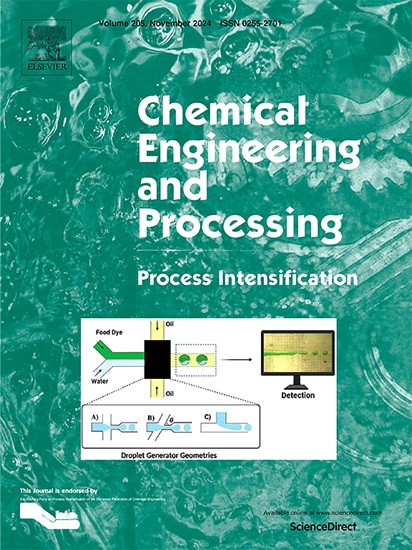Mechanism study on the influence of non-thermal plasma on the oxidation performance of Pt catalyst during DOC regeneration
IF 3.9
3区 工程技术
Q3 ENERGY & FUELS
Chemical Engineering and Processing - Process Intensification
Pub Date : 2025-05-01
DOI:10.1016/j.cep.2025.110333
引用次数: 0
Abstract
The aging deactivation of noble metal catalysts is a critical challenge for diesel oxidation catalysts (DOC). This study investigated the regeneration of aging DOC using non-thermal plasma (NTP) technology. Combined with catalytic oxidation performance testing of platinum (Pt) catalysts on DOC and analyses through EDS, BET, O2-TPD, TEM, and XPS, the effects of NTP regeneration were evaluated. NTP effectively degraded carbon deposits within the DOC at temperatures below 210 °C, lower than the DOC’s maximum operating temperature and the Pt catalyst’s deactivation temperature. During regeneration, BET area increased by 39.06 %, average particle size decreased by 28.5 %, relative carbon content in the Pt catalyst dropped by 60.9 %, and relative oxygen content increased. NTP promoted deep oxidation of Pt, forming oxide layers of PtO (0.22 nm) and PtO2 (0.11 nm), which enhanced catalytic efficiency for CO oxidation. NTP successfully regenerated DOC, restored performance lost due to aging deactivation, and improved the low-temperature activity, stability, and high-temperature resistance of Pt catalysts.

DOC再生过程中非热等离子体对Pt催化剂氧化性能影响的机理研究
贵金属催化剂的老化失活是柴油氧化催化剂(DOC)面临的关键挑战。本研究利用非热等离子体(NTP)技术研究老化DOC的再生。结合铂(Pt)催化剂在DOC上的催化氧化性能测试,并通过EDS、BET、O2-TPD、TEM和XPS分析,评价了NTP再生的效果。NTP在低于210°C(低于DOC的最高工作温度和Pt催化剂的失活温度)的温度下有效地降解DOC内的积碳。再生过程中,Pt催化剂的BET面积增加了39.06%,平均粒径减小了28.5%,相对碳含量下降了60.9%,相对氧含量增加了。NTP促进Pt的深度氧化,形成PtO (0.22 nm)和PtO2 (0.11 nm)的氧化层,提高了CO氧化的催化效率。NTP成功地再生了DOC,恢复了因老化失活而损失的性能,提高了Pt催化剂的低温活性、稳定性和耐高温性能。
本文章由计算机程序翻译,如有差异,请以英文原文为准。
求助全文
约1分钟内获得全文
求助全文
来源期刊
CiteScore
7.80
自引率
9.30%
发文量
408
审稿时长
49 days
期刊介绍:
Chemical Engineering and Processing: Process Intensification is intended for practicing researchers in industry and academia, working in the field of Process Engineering and related to the subject of Process Intensification.Articles published in the Journal demonstrate how novel discoveries, developments and theories in the field of Process Engineering and in particular Process Intensification may be used for analysis and design of innovative equipment and processing methods with substantially improved sustainability, efficiency and environmental performance.

 求助内容:
求助内容: 应助结果提醒方式:
应助结果提醒方式:


